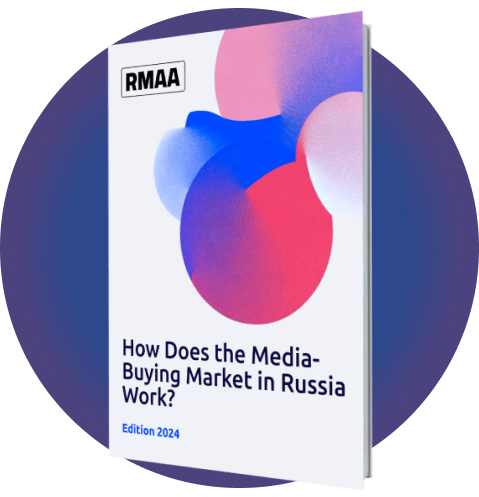Blog about successful marketing strategies in russia
Future of the Advertising Market in Russia 2022. Is There Any Hope?


MEDIA BUYING
Share this Post
The advertising market in Russia has always shown a tendency to stable development. This was stipulated by many factors, including: the presence of large manufacturing companies in the Russian Federation with large media budgets, appearance of new brands (including domestic ones), a more structured approach to product promotion and the introduction of new technologies, development in the digital segment, etc. Due to all of the above, the growth of advertising investments in Russia increased by 17.5% in 2021, according to the Dentsu communication group.
At the beginning of 2022, Insider Intelligence experts assumed that the growth of advertising costs on the Russian market would average 7.5% ($6.89 billion). However, in March, the situation changed dramatically, as well as the political situation in the world.
Amid the anti-Russian sanctions, many foreign brands have stopped their activities within the territory of the Russian Federation, including advertising. According to the estimates of Andrey Skorodumov, the head of OMD OM Group, about the third of digital advertising accounted for foreign brands. On top of that, Google company refused of advertising sales in Russia, and Meta* (that owns Facebook** and Instagram**) was recognized as extremist. These events were followed by a number of others, which also affected the advertising industry as a whole. As a result, the advertising market in Russia almost instantly “has frozen” in its development, and sales figures have decreased by about 60% (according to Dentsu).
RMAA experts, relying on their own advertising experience, as well as the opinions of other reliable sources, have tried to look into the situation more closely.
What is Happening in the Advertising Market Now?
Despite all the crisis circumstances, representatives of the National Advertising Alliance (NAA) are confident that the situation will stabilize after a while. By the way, the Russian market has repeatedly experienced “ups and downs" for various reasons.
For example, in 2014 (in the light of political events in Crimea) the Coca-Cola Company refused to conduct an advertising TV campaign on 4 leading TV channels (REN TV, Channel Five, Domashny, Zvezda), explaining its position by economic reasons related to sanctions. After a while, the brand resumed its advertising activity again.
In April-May 2020 (pandemic time), many corporations also suspended their activities as part of promotion in Russia. The NAA, in its turn, managed to “retain” advertisers by introducing a penalty policy, thanks to which the campaigns were postponed to a later date. The Alliance decided to adhere to the same system now.
"Most of the transactions are concluded for a year, which implies the implementation of not only annual, but also monthly budgets. In case of non-compliance with the parameters of the transaction, we will act according to the contractual terms." - the NAA representatives explain their position.
According to the Russian Association of Advertising Agencies (RAAA), the volume of the Russian advertising market in 2021 amounted to 578 billion rubles, of which 313.8 billion rubles - digital; 197.3 billion rubles - TV; out of home (including outdoor advertising) - 45 billion rubles; radio - 14 billion rubles; print publications - 8.2 billion rubles.
At the same time, the TOP 2021 advertisers in Russia included not only foreign companies, but also domestic ones.
Top 15 largest advertisers in Russia 2021, mln RUB without VAT
|
Place |
Advertiser |
Total |
TV |
Internet |
Press |
OOH |
Radio |
#2019 |
|
|
1 |
SBER |
7 887 |
3 948 |
3 601 |
37 |
134 |
167 |
25 |
|
|
2 |
МТS |
6 373 |
2 848 |
2 955 |
9 |
319 |
242 |
4 |
|
|
3 |
NESTLE |
6 118 |
4 582 |
1 490 |
15 |
32 |
|
2 |
|
|
4 |
TELE2 |
5 645 |
2 082 |
2 383 |
|
757 |
422 |
11 |
|
|
5 |
RECKITT BENCKISER |
5 159 |
4 034 |
1 124 |
1 |
|
|
3 |
|
|
6 |
PEPSI CO |
5 097 |
4 016 |
1 000 |
|
49 |
32 |
1 |
|
|
7 |
X5 RETAIL GROUP |
4 467 |
2 566 |
1 137 |
3 |
679 |
83 |
20 |
|
|
8 |
OTC PHARM |
4 329 |
2 931 |
1 228 |
|
|
170 |
12 |
|
|
9 |
PROCTER & GAMBLE |
4 186 |
3 144 |
1 027 |
14 |
|
|
8 |
|
|
10 |
TCS GROUP HOLDING |
4 154 |
2 202 |
1 940 |
2 |
7 |
4 |
18 |
|
|
11 |
VOLKSWAGEN |
3 993 |
2 258 |
1 243 |
110 |
70 |
311 |
22 |
|
|
12 |
MAIL.RU GROUP |
3 933 |
2 726 |
724 |
1 |
370 |
113 |
29 |
|
|
13 |
BEELINE |
3 918 |
1 850 |
1 674 |
1 |
345 |
48 |
7 |
|
|
14 |
MEGAPHONE |
3 788 |
1 744 |
1 634 |
|
179 |
231 |
5 |
|
|
15 |
MIRATORG |
3 434 |
2 820 |
601 |
3 |
5 |
4 |
17 |
|
Source: Sostav.ru data based on Mediascope, Espar Analytical, AdMetrix, Digital Budget, Similarweb
At the end of March, 4 foreign brands that are in the TOP 10 advertisers announced the suspension of advertising investments in 2022 (Nestle, Reckitt Benckiser, PepsiCo, Procter & Gamble). Other companies that ranked lower positions with advertising budgets of at least 2,500 billion rubles in general, particularly Mars Russia, McDonald's, L'oreal, Ferrero, Coca-Cola, Safoni Aventis, GSL Consumer Healthcare, joined them.
What is Next?
There are only two scenarios on the Russian advertising market. Either the companies will completely stop advertising activities within the Russian Federation, or they will take a “time-out” for a certain period in order to return again later (including to the advertising market). Having gathered opinions on this matter from 4 large advertising groups, the Adpass service predicted both optimistic scenarios on the market and negative consequences. In the first case, the market will develop steadily, reaching 515 billion rubles by the end of 2022. In the worst case, it will be 289 billion rubles (-50% of today's statistics), returning to the indicators of 2011. At the same time, many experts are sure that the latter will be unlikely, but some budgets will be reduced anyway.
GroupM considers that the TV sector will suffer the most (by at least 25%), while online advertising - by 17%. Analysts from Publicis do not see the difference between these segments and believe that the decline will be the same everywhere. OMD OM Group experts are concerned about the digital environment, predicting a decrease in digital advertising indicators by at least 17.7% (maximum - 27.7% in the worst case), while TV advertising is likely to remain at current levels, or decrease by 8.7%.
Russian Advertising Market in 2022
|
Scenarios |
Total, % |
TV |
Internet |
OOH |
Radio |
Press |
|
OMD OM Group |
||||||
|
Optimistic |
-11 |
0 |
-18 |
-10 |
1 |
-45 |
|
Pessimistic |
-20 |
-9 |
-28 |
-16 |
-4 |
-53 |
|
Negative |
-50 |
|||||
|
Dentsu Russia |
||||||
|
Optimistic |
-20 |
|||||
|
Pessimistic |
-30 |
|||||
|
Publicis Groupe Russia |
||||||
|
Optimistic |
-20 |
-20 |
-20 |
-15 |
-20 |
-50 |
|
Pessimistic |
-50 |
-50 |
-50 |
-50 |
-50 |
-70 |
|
GroupM |
||||||
|
Optimistic |
-21 |
-25 |
-17 |
-26 |
-30 |
-65 |
|
Pessimistic |
-32 |
-35 |
-28 |
-35 |
-47 |
-68 |
|
Negative |
-40 |
-47 |
-35 |
-41 |
-50 |
-72 |
Source: Adpass.ru based on ACAR data
Why are Opinions so Ambiguous?
On the one hand, the purchase of TV advertising in 2021 accounted, to a greater extent, for foreign companies. The top three were Nestle (4.6 billion rubles), Reckitt Menckiser (4.04 billion rubles) and PepsiCo (4.01 billion rubles), which suspended promotion within the Russian Federation in March 2022. It is not difficult to calculate that without foreign brands, the TV sector will “suffer” losses.
But on the other hand, it is also incorrect to say that digital will not “be unaffected". Although Russian companies are considered to be the procurement leaders in 2021 - Sber (3.6 billion rubles), MTS (2.955 billion rubles) and Tele2 (2.4 billion rubles). However, iIt should be noted that online advertising in Russia is "experiencing" immigration on domestic resources, as Youtube, Google, TikTok, Facebook**, Instagram** have become inaccessible tools. Accordingly, it is also not correct to talk about positive forecast for development of the segment without a complete reorientation of both advertisers and audience for promotion through other channels.
Plus, foreign gaming brands have “left” the Russian market, taking with them budgets for digital advertising. At the beginning of March 2022, the largest marketplaces (PlayStation Store, Nintendo, Stream) stopped accepting payments with Russian cards. After that, revenues in the gaming segment dropped, on average, by 15-17%. According to Gadji Makhtiev, the founder of the project rawg.io, the domestic video game market will decrease by 50% compared to 2021 at year-end 2022. But the drop may be even greater - up to 75-85%. Therefore, advertising investments in this segment will also decline.
A contradictory situation has also developed with outdoor advertising. Most experts agree that this sector will suffer the least, since the share of foreign companies is about 15% of the total budget. But there is another problem related to the increase in prices of materials for printing.
In all cases, there are both positive and negative sides of the current market situation. That is why most advertisers have the same question - is there any hope for a bright advertising future in Russia? Based on data from various sources, we can say that there is still hope.
Prospects of the Advertising Market 2022
They are mainly related to the state support and increase of investment in the industry, as well as the appearance of new brands.
In the first case, companies rely on credit and tax benefits, including from the National Advertising Alliance. Besides, advertisers hope for a “softening” of advertising restrictions on alcohol, tobacco and pharmaceutical products. In its turn, it may bring about the growth in budgeting of many advertising segments. In addition, Dentsu experts suggested that the state will support national projects and social initiatives by allocating direct funds for advertising.
At the same time, today, according to the Gallery's outdoor advertising specialists, financial companies, banks, real estate and construction firms have begun to increase advertising budgets. Most likely, this trend will affect not only the “outdoor advertising”, but also other segments on the market.
“In recent years, the share of advertising investments of local companies — first of all, ecosystems, banks, retailers, telecoms — has been dramatically growing. And the share of Western companies was falling down. In 2021, we finally came to the market of ecosystem competition (Yandex, Sberbank, MTS, Ozon, VK) and the struggle for subscriptions, so with the departure of Western companies, a complete collapse is still not expected," Dentsu experts state.
And of course, many experts are waiting for new foreign brands to appear on the market from Southeast Asian countries, China, the UAE and Turkey. As Russia is a promising region for them to promote their products (in the absence of European and American competitors).
In any case, changing the marketing strategy with an increase in advertising turnover, as well as reaching a new audience, require serious planning from the company. If you are contemplating about it, RMAA experts are ready to help in the implementation of this task, taking into account the current circumstances in the Russian advertising market.
* The organization is recognized as an extremist and banned in Russia.
** Social networks are recognized as extremist and banned in Russia.
Join 2,000+
of your Peers!
You will be the first to know about Russian marketing insights, news and updates from our agency. Stay tuned!
Get our latest articles delivered to your email inbox and get our exclusive White Paper
"A media buyer's quick guide for effective work in Russia"
for FREE!
How does the Media Buying Market in Russia Work?
Navigating the Media Buying System in Russia

Ready to partner with the specialists in Russian marketing and advertising?
About the Author
A content lead. Natalia runs marketing projects promotion with different digital tools in the Russian-speaking market.
Join 2,000+ of your Peers!
Get our latest articles delivered to your email inbox and get our exclusive White Paper "A media buyer's quick guide for effective work in Russia?" for FREE!
You will be the first to know about Russian marketing insights,
news and updates from our agency.
Stay tuned!
We're updating our website's design step by step, so some pages may look different. Thank you for your understanding.
Got it














